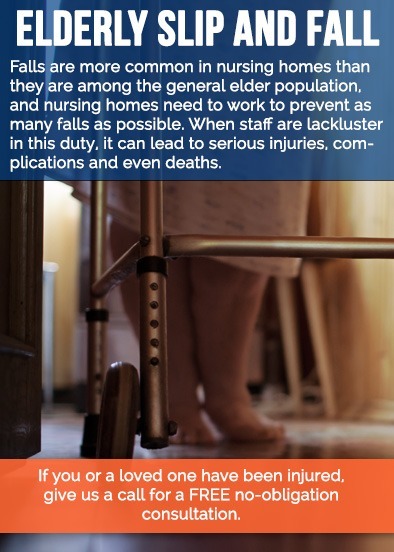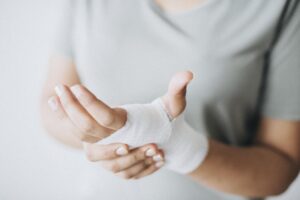 For a senior, slipping and falling can be very serious. Falls are more common in nursing homes than they are among the general elder population, and nursing homes need to work to prevent as many falls as possible. When staff are lackluster in this duty, it can lead to serious injuries, complications and even deaths.
For a senior, slipping and falling can be very serious. Falls are more common in nursing homes than they are among the general elder population, and nursing homes need to work to prevent as many falls as possible. When staff are lackluster in this duty, it can lead to serious injuries, complications and even deaths.
If you or someone you love has fallen and been injured, it’s possible that the nursing home could have prevented it. You may be eligible for a financial recovery that could help pay for treatment and ongoing medical bills.
John Foy & Associates is one of Atlanta’s largest elder care law firms. We believe strongly in the rights of seniors and their families.
Call us at 404-400-4000 and get a free consultation today.
How Common Is Slipping and Falling in a Nursing Home?
Falls are a risk for all seniors. About one third age 65 and older experience a fall every year. The risk goes up dramatically above age 80. But the risk is higher in nursing homes than it is in the community. According to the Center for Disease Control:
“Between half and three-quarters of nursing home residents fall each year. That’s twice the rate of falls among older adults living in the community.”
There are many reasons for the higher rate in nursing homes:
- The average age of seniors in nursing homes may skew higher, and older adults are at higher risk in general
- Seniors in nursing homes often have health conditions that affect their balance or mobility
- Many nursing home residents face Alzheimer’s disease and confusion, which may lead to more accidents
Nursing home staff have a duty to be aware of these factors and take precautions. They should also understand how serious a fall can be and respond appropriately.
Get the strong arm
How Serious Is a Fall for an Elderly Resident?
The effects of a fall can be serious and even life threatening. In some cases the injury is clear as soon as the senior falls. In others, the senior may appear alright at first but have lingering injuries that get worse over time.
A senior’s body is much less able to absorb the impact of a fall, especially with conditions like arthritis or osteoporosis, both of which are common among the elderly.
More than 2 million seniors a year are taken to emergency rooms for falling injuries. Some of the most serious effects of a fall for an older person include:
- Fractured bones, such as a broken hip or wrist. More than 95% of hip fractures are caused by falling.
- Traumatic brain injury. Falls are the single most common cause of a brain injury for seniors. In many cases a senior may not show outward physical signs of a concussion unless they are specifically examined for it.
In addition, seniors who fall may not be able to get up again. Laying on the ground or floor can cause further complications, such as muscle damage, pressure sores, exposure and hypothermia, blood loss and the risk of pneumonia.
Likewise, even seniors who are treated immediately may not heal quickly, and they face the risk of infection from open wounds or surgery.
Sadly, some nursing home residents will never recover from their accident. In old age even the most minor falls can be deadly.
Are Falls Inevitable for the Elderly?
Because falls are common among the elderly, many people wrongly believe they’re unavoidable. This couldn’t be farther from the truth. There are specific factors that put a senior at risk of falling, and many of them can be mitigated.
Falling risks include:
- Difficulty walking
- Walking without a cane or walker where one is merited
- Past history of falling
- Issues with balance
Many medications can also increase the risk of falls, including some over the counter medications.
Nursing homes are aware of all of these causes, and there are basic practices to mitigate each one. They have the power to reduce the number of falls among the elderly.
How Can a Nursing Home Prevent Falls?
Simply screening residents can prevent falls. Every nursing home should conduct an assessment for risk of falling when accepting a new resident. The assessment looks at all the risk factors above and allows staff to know which seniors need extra precautions to reduce the chance of falling.
Based on the results of this assessment, a variety of methods can be used:
- Silent alarms on beds and wheelchairs, that detect pressure changes and alert staff when a senior is in danger of falling
- Use of devices such as walkers to aid high-risk residents
- Staff assistance when moving around the facility
- Proper supervision
- Special “bed mats” on the floor beside the bed, that can substantially soften falls if they do happen
Additionally, all nursing homes should make use of proper ergonomics. Beds should be set at a height that is comfortable for the individual resident getting in or out of it, and all furniture and floor plans should be mobility-friendly. Hand rails should be available on many or all walls.
What Should Nursing Home Staff Do If a Resident does Fall?
Nursing homes should do three things after any fall:
- Treat the fall seriously and get the resident prompt treatment.
- Treat the fall as a “significant change in condition,” even if no serious injuries are apparent. A significant change in condition is one that requires attention from a physician and must be reported to the resident’s family.
- Take precautions to prevent it from happening again.
To do this effectively a nursing home must investigate the cause of the fall. It’s not enough to simply say, “Falls happen all the time.” Each fall has a cause. When the cause isn’t investigated it leaves families feeling confused as to why their loved one was injured. It also makes it more likely that the same cause will lead to another fall.
Are Nursing Homes Liable for Elderly Slips and Falls?
In many cases, yes they are. No nursing home can prevent every fall. But nursing homes have a duty to take measures to prevent as many falls as possible, and to respond appropriately. At a minimum a nursing home must:
- Have a clear policy for managing falls, including assessing fall risk, responding to falls, and investigating falls when they happen
- Carry out that policy at all times, for each resident
If the nursing home or its staff don’t do these things, they have neglected their duty to your loved one. This makes them legally liable for the consequences of the fall.
There is no way to undo a fall that hurt someone you love. But you do deserve help. You may be entitled to a financial recovery that could help you pay for your loved one’s hospital bill, followup care and other costs.
John Foy & Associates has a history of success with elderly slip and fall cases. We offer a FREE consultation and we charge nothing unless we get you a financial recovery.
Call 404-400-4000 and get your free consultation today.
404-400-4000 or complete a Free Case Evaluation form






